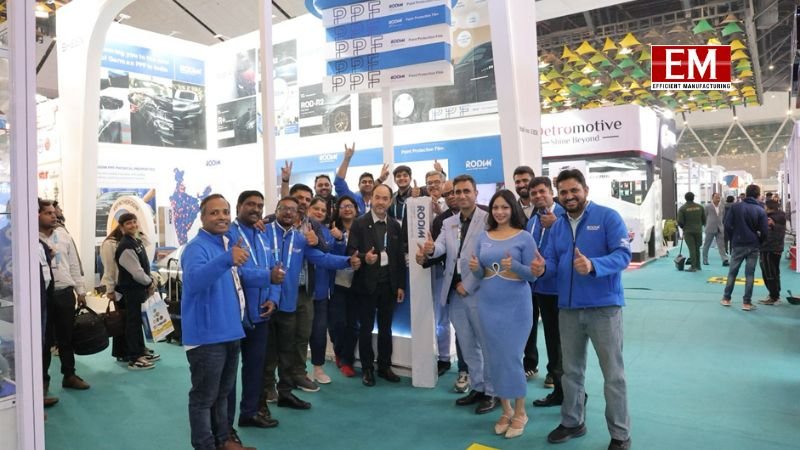| Multiple studies have long indicated that strategic decision-making capacity in the administration of supply chain operations can be a key factor in determining a manufacturer’s capability to thrive in competitive environments.
Kavindra Singh,
Director of Engineering,
Intellicus Technologies
To make well-informed decisions, supply chain managers need a reliable foundation of data and analytics that they can trust. Without a solid foundation of data insights supporting their decisions, they are left to speculate on actions that enhance shipping times, procure the appropriate supplies or meet customer demands effectively.
Business Intelligence (BI) platforms and tools facilitate building a holistic and comprehensive view of supply chain operations. An integrated approach that consolidates all pertinent logistics and inventory data enables business leaders to gain deeper insights into various facets of their supply chain, ultimately contributing to more effective decision-making.
It is thus no surprise that a Gartner study of 500 supply chain professionals in 2022 highlighted that 38% of organizations have invested in improving technology that supports data-driven process orientation among multiple enterprises that are partners in their supply chain. More than 50% of the organizations in the study expect to use AI and data analytics by 2024 to drive supply chain decisions.
Evolution of Supply Chain: An Example of Grocery Shopping
Let us consider the mundane task of grocery shopping to understand why the key to staying competitive lies in their ability to leverage data and business intelligence tools for agile decision making for SCM professionals.
Grocery shopping has undergone a remarkable evolution, reflecting shifting consumer preferences. Earlier, shoppers favored traditional brick and mortar stores for their routine purchases, valuing the personal touch and local produce. The emergence of malls and superstores marked a significant shift, offering a one-stop-shop experience with a wider array of products that were fulfilled by well-orchestrated supply chains, as well as cold chains. The digital era ushered in the age of e-commerce which allowed consumers to browse, purchase and get deliveries of groceries from the comfort of their homes. The distribution chain was thus extended from the stores and warehouses to include the last-mile delivery logistics, adding more variables that were to be managed like “delivery window” and “return to origin”.
Today, q-commerce (quick commerce) is pushing the envelope further with 30 mins, or even 15 mins delivery timelines. As consumers transition through these shopping paradigms expect ever more, supply chain professionals are compelled to adapt swiftly. By analyzing purchasing patterns, inventory turnover and market trends, managers are required to make quick decisions to optimize stocking, warehouse locations, logistics and consider even traffic and weather conditions to ensure quick and foolproof deliveries. In this dynamic environment, data-driven decisions become a cornerstone for SCM professionals striving to meet the ever-changing demands of their customer base.
The Role of BI in Strategic Decision Making in Supply Chain
Organizations are required to adapt to the dynamic nature of supply chain operations. BI transforms raw data into actionable intelligence, offering SCM professionals the insights needed to make quick strategic decisions that positively impact operational efficiency, cost-effectiveness and overall supply chain performance. Some key BI functionalities that result in better decision making in SCM are:
Analysis and Reporting of Current Operations: BI tools enable a comprehensive analysis of current SCM operations by aggregating and processing vast datasets. This analysis involves scrutinizing various aspects such as inventory levels, order fulfillment rates, transportation efficiency and supplier performance. With BI tools, managers gain actionable insights into the strengths and weaknesses of their current processes, facilitating informed, data-driven decision making to streamline operations and optimize resource utilization.
BI systems empower SCM professionals to generate customized reports tailored to the specific needs of the supply chain. These reports can encompass a wide range of metrics like inventory turnover, lead times, demand forecasting accuracy and supplier reliability. The ability to create targeted reports allows managers to focus on key performance indicators (KPIs) relevant to their goals, aiding in a more precise and effective decision-making process.
Real-time Dynamic and Ad-hoc Querying: BI tools provide real-time access to key metrics through dynamic online queries. This allows supply chain managers to interactively explore and analyze data, drilling down into their specific need-based details. Whether it’s monitoring real-time inventory levels, shipment status or evaluating supplier performance, dynamic queries enable a swift and intelligent decisions. The immediacy of information ensures that managers can make timely interventions to address emerging challenges or capitalize on new opportunities.
Enhanced Collaboration and Communication: BI fosters a more connected and collaborative environment among departments, which is crucial for the seamless coordination in SCM. It provides holistic, real-time visibility within the supply chain, promoting a single source of truth, transparency and proactive decision-making.
Transparency is pivotal in building trust across the supply chain. Sharing data and reports with suppliers, customers and stakeholders establishes a foundation of openness, reduces uncertainties and facilitates quick issue resolution.
BI dashboards further aid communication by visually presenting KPIs and metrics, simplifying complex information for decision-makers. These tools not only optimize internal processes, but also act as communication enablers, making it easier to convey performance insights. Ultimately, collaborative decision-making leads to a more efficient and resilient supply chain ecosystem.
Optimizing Supply Chain Network: Using BI for supply chain network optimization results in a more responsive, cost-effective and customer-centric process that aligns with the dynamic demands of the marketplace. Supply chain network optimization spans material procurement, logistics, inventory management, production, quality control, dispatch and product returns. BI tools enable a comprehensive analysis of each of these components, ensuring a holistic approach to optimization.
BI tools expedite the identification of bottlenecks within the supply chain. For example, it can highlight areas where delays commonly occur. These insights empower decision-makers to strategically address inefficiencies, optimize routing and streamline processes.
Simulation-Based Strategic Decisions: BI tools enable the creation of detailed models that simulate different scenarios. For example, using BI-driven simulations, SCM professionals can analyze the impact of changes in variables such as demand fluctuations, supplier delays or production disruptions. Simulation allows SCM professionals to assess the potential outcomes of various strategies before implementation and facilitates informed decision making. This capability is invaluable, as it provides a risk-free environment to test different approaches and evaluate their consequences on KPIs.
Simulation models also empower SCM teams to optimize ongoing processes and resource allocation. For example, with simulations based on historical data and real-time inputs, organizations can identify vulnerabilities in the supply chain and proactively devise strategies to mitigate risks or capitalize on opportunities.
BI-driven simulation in SCM is a forward-looking approach, helping organizations anticipate challenges and take actions that align with their strategic objectives. This proactive and strategic use of BI not only enhances decision-making accuracy but also contributes to the overall resilience and adaptability of the supply chain in dynamic business environments.
Financial Management and Planning within SCM: BI serves as a bridge between financial management and operational planning in SCM, fostering a symbiotic relationship between the two. BI tools provide a robust analytical framework for examining historical financial data, operational costs and performance metrics. This analysis helps in creating accurate and informed budgets that reflect the financial realities of their supply chain operations. A granular analysis of expenses related to material procurement, logistics, inventory management, production and distribution enables financial managers to allocate resources efficiently, identify areas for cost optimization and set realistic financial targets.
Through predictive analytics, BI applications enable organizations to anticipate future demand patterns with greater accuracy. This foresight is instrumental in aligning production and inventory levels with anticipated sales, preventing overstock or stockouts. A data-driven approach ensures that financial decisions are rooted in operational realities, enhancing the efficiency and profitability of the supply chain.
Innovating for the Future with BI
Using a patented algorithm for “anticipatory shipping”, Amazon forecasts customer orders even before they are placed and initiates delivery logistics. Amazon aims to pre-empt what items a customer might order by leveraging advanced data analytics and machine learning algorithms and by analyzing a myriad of factors such as past purchasing behavior, product views, time of day and even cursor movements. They can thus offer reduced delivery times by moving these items to distribution centers or local hubs nearby, strategically positioning products closer to potential buyers.
Anticipatory shipping is a testament to the power of data-driven decision-making in the e-commerce and supply chain domains. Web and customer data at the organization’s disposal allows for a nuanced understanding of consumer behavior, enabling them to set the rules of the game.
Such forward thinking innovations using data and BI have a transformative potential in SCM while using advanced logistics to meet customer expectations. The strategic integration of BI into supply chain management has now become a standard norm for the industry. Data-driven strategies continue to shape the future of e-commerce and supply chain management, fostering innovation, efficiency and competitive advantage.








